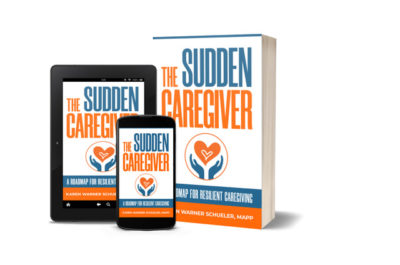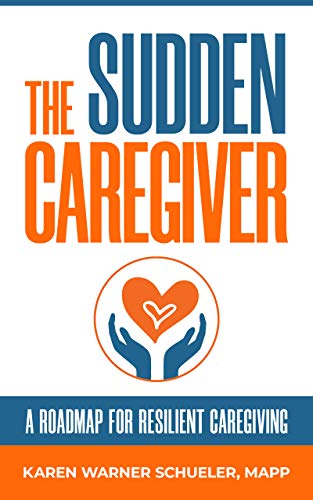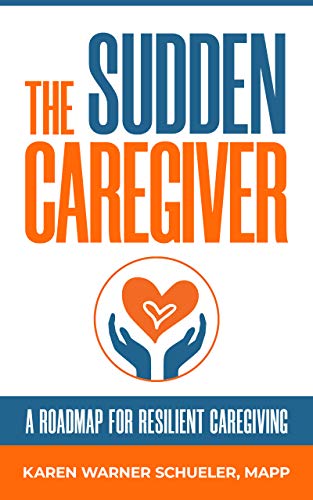She was not a caregiver. Until she was.
A practical and proven guide, a roadmap, and a source of comfort for anyone who is caring for a loved one, and especially for those for whom the role was unexpected

Guest Post: Do These Four Simple Things to Change Your Caregiving Story
By Karen Warner Schueler
My husband was diagnosed out of the blue with stage IV cancer. We never saw it coming. There were no alarming symptoms, just some back pain that wasn’t getting better.
On the day that he received his sudden diagnosis, I became a sudden caregiver. Our lives changed immediately and they never changed back. I cared for him for 18 months, from diagnosis until his death in April 2016.
There are now 53 million caregivers in the US alone and caregivers make up about 11% of the populations of most developed countries.
I had just gotten my Master’s degree from Penn in Positive Psychology and began to apply the research I knew about resilience and well-being to my day-to-day caregiving. It wasn’t perfect or easy, but it did make a difference to my life and to my husband’s. I’ve put together four simple steps you can take that will make a difference in your caregiving story. I’m sensitive to not putting any more work on caregivers’ plates, so I want to stress the size of these things — they’re all manageable.
- Start a daily gratitude journal. It works and it doesn’t cost anything. But make it a habit to notice and write down good things that happened:
- What were one, two, or three good things that happened today? These don’t have to be big, just noticeable.
- Who was one good person who made a difference?
- Why it works. Humans are wired for survival, and during caregiving, that’s your focus. So if you’re surviving, you’re seeing things you need to protect yourself from. If you want to thrive, look for the good stuff.
- Build in mini-breaks.
- Identify something you love to do and build a mini-break around it on as many days as you can: One caregiver I know saves the Sunday crossword puzzle and works on a little bit of it every day. One person makes a cup of tea at 3pm every day and sits quietly with it for 15 minutes before going to the next task. One husband-caregiver gets up super early and goes for a morning run before the day gets underway. I used to walk the dog through the woods behind our house. We lived in New England, so this was in rain, shine, or more often, ice and snow.
- Why it works. There’s evidence that shows that “mental health” breaks — no matter how short — interrupt ongoing depletion and can even restore the energy you’ve spent.
- Set small goals for yourself and work toward them.
- Choose something manageable that, if accomplished, would provide satisfaction. Begin right away to make progress against it. You might want to start working out, for example, but there are a lot of logistics involved, especially during Covid. You might want to better understand your finances. Or, you might just want to declutter your closets.
- Write the goal down and break it into sub-tasks so that you begin to focus on making it happen. If you want to get more exercise, what type? At what time of day could you do it? What programs are available online or on TV that would work? Who else could help you?
- Why it works. The act of progress toward our goals, not just succeeding at our goals, gives you a sense of creating something, of being in control of something, all of which raises your positive emotions. When we feel good in the moment, we tend to broaden our outlook and see more options than we previously had. This generates a positive upward spiral. The better we feel, the more options we see, the more options, the better we care for others.
- Create a “care-leading squad.”
- Create a “care-leading” squad of people you absolutely trust who can help you when you need it.
- What do you need done and who do you know who’s great at it? For example, I am not handy around the house. My friend, Nick, knows his way around a toolbox. I’m not good at dealing with anything mathematically complicated, like insurance bills, but my friend, Richard, lives for that. They became “The Handyman” and “The Numbers Guy” on my “care leading” squad.
- Select the best people for each job and line them up even if you don’t need them right now. And this is important: define “best” as:
- 1) You can be completely yourself around them and not have to edit yourself or hide your dirty laundry — figuratively and literally.
- 2) They do what they say they’re going to do, no matter what.
- Why it works. Caregivers are notorious for going it alone and they don’t have to. Other people matter. If you line up your trustworthy squad before you need them, they’ll be ready for you in a crisis, leading to peace of mind when you need it most. And by letting them take care of you, it frees you up to take care of the one who really matters: the person in your care.
Karen Warner, MAPP, is an executive coach and president of Tangible Group, and author of The Sudden Caregiver, www.TheSuddenCaregiver.com.
The Sudden Caregiver: A Roadmap for Resilient CaregivingBy Karen Warner Schueler
On the day Karen became a sudden caregiver, she was a wife, a mom, a consultant and business owner, a coach, a runner, a friend, and a consumer of too much Starbucks coffee. On that day when her late husband was diagnosed — out of the blue — with stage IV cancer, Karen certainly had no idea that she had instantaneously joined a silent army of informal, unpaid family caregivers around the world who had also been pressed into sudden service.
With the acronym C-A-R-E (Crisis, As Normal as Possible, Resolution, and Evolution), Warner Schueler explains each phase of caregiving and helps the reader apply what they need for their unique situation, including her own personal stories and stories from caregivers of all types. The author invites readers to dive right in where they feel they need the most help, as every caregiving situation is unique.
Karen guides readers through evidence-based strategies, drawn from the principles of positive psychology, that are designed to help raise well-being and resilience for both the caregiver and the person in their care. They provide direction on the lessons of caregiving once your role as caregiver ends.
In addition to the book and worksheet appendix, readers can download a free Sudden Caregiver’s Playbook, with helpful worksheets and activities to guide the caregiver through each step of the journey.
About the Author
Social media:
https://www.
https://www.TangibleGroup.com/
https://www.facebook.com/
https://www.linkedin.com/in/




